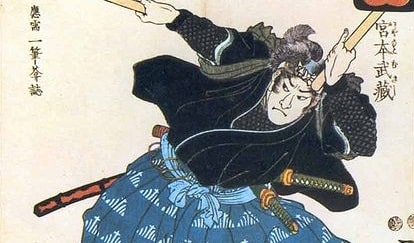
I was reading The Book Of Five Rings the other day (don’t ask!). Purportedly a book relevant to business strategy, it is essentially the legacy of Miyamoto Musashi’s learnings as Japan’s ‘greatest swordsman’. I’m all for a good analogy, but I’d have to say that there are a lot of things Musashi san recommends, that feel like the precise opposite of good 21st Century business practice. Anyway, taking the perspective that there’s good in everything, two things struck me about the Five Rings.
The first is that it was full of contradictions:
Picking up on these contradictions, rather than being a criticism of the book, I propose is actually its essence. The contradictions are in effect the good questions that force the reader to think.
A warrior should have a teacher and not have a teacher.
They need to understand the peaceful arts as well as the killing arts.
‘The end result of any study is a kind of death before the attainment of perfection.’
The need to devote all available time to being a warrior and also to be knowledgeable of other domains (‘to learn the sword, study the guitar’).
‘There is no purpose in trying to determine whether one is better than another. If anything is anything, then everything is everything.’
‘Do not confuse profit with profitability.’
Rules are rules, but some rules ‘can be changed to suit a particular need.’
Have complete confidence but also have contingency plans.
‘To know ten thousand things, know one thing well.’
The ‘spirit’ should be large and small.
‘The ultimate weapon is “thing-no-thing”.’
‘Timing and rhythm – they are one and the same thing, yet they are different’.
‘See that which cannot be seen.’
They must be alone and interact with society.
‘Learn to see things far away and close up.’
‘Remember, as you submit to the “spirit of the thing”, that the “spirit of the thing” will submit itself to you.’
‘The grip (on the sword) should be both loose and tight at the same time.’
‘An attack must be conducted with quickness, not speed.’
‘Attack with power not strength.’
‘The strategy of “attack-no-attack.”’
Be relentless and direct… but always have an escape route.
‘The warrior first understands being a warrior when he no longer concerns himself with being a warrior.’
‘Become the enemy.’
‘To suffocate a shadow.’
Shout to scare the enemy… but not too much.
All attacks should be direct… but look for and chip away at the weak spots.
‘Think of strategy as being a snake’s head and a snake’s tail.’
‘Attitude/no-attitude.’
Your sword should be long… but not too long
‘The spirit of the universe is an emptiness which is no-thing.’
‘In the universe, no-thing-ness is not a thing that is true and not a thing that is not true.’
‘Because all the universe is simply no-thing-ness, there is no reason to pursue any attempt at perfection. Perfection is all there is and when you come to realise this, you will have understood my Way.’
(Not that I’m a big fan of the bible, but I was struck by similarities with the research project identifying all the 400+ contradictions it contains (https://philb61.github.io/index.html). Scanning through the list, it looks like half of the ‘contradictions’ are more like discrepancies (like, how many sons did Absalom have), but the actual contradictions (‘is it okay to covet?’) are there, I think, to make readers think for themselves. Or at least that’s the strategy I would’ve used if I were writing a book designed to make readers think. Hmm.)

Meanwhile, biblical diversion over and back to the Book Of Five Rings, the second thing that struck me was a series of things that I thought were contradictions that Musashi’s warrior philosophy told me weren’t. They include:
There can be no difference between frivolous contests/training and a real fight-to-the-death battle – encounters are only meaningful if physical death is a reality.
There are no shortcuts.
‘All things can only be built from the ground up and in one stage at a time.’
Always have a sword in each hand.
‘Whether on or off the battlefield, there is no difference in spirit. The warrior sees all life as the battlefield.’
‘Always fight with your spine erect and unbent.’
‘Do not show your enemy false bravado.’
‘The only reason to draw your sword is to cut the enemy down.’
‘There is no difference between walking and running into battle or walking and running in everyday life.’
‘Do not be a “righty” or a “lefty”. Become both by practicing your movements from all directions.’
Use your enemy’s strength as your own.
‘Everything emanates from a central core. This is true of all things regardless of their appearance.’
‘An attack of any kind must originate from the centre of the warrior and go direct to the centre of the enemy.’
Always remain calm.
‘Always return your weapon along the same path it travelled out on.’
‘The sword is an extension of the body.’
‘Stick to the enemy like glue.’
‘In fighting it is always best to go straight in.’
‘Do not attempt to be clever with your feet.’
‘Everything is within. Everything exists. Seek nothing outside of yourself.’
Ultimately, both strategies – revealing contradictions that are and contradictions that aren’t – in Musashi’s philosophy are intended to achieve the same goal. And that is to force people to do what people normally avoid doing: think. And maybe that’s ends up providing the main connection between being a great warrior and a great business leader?
